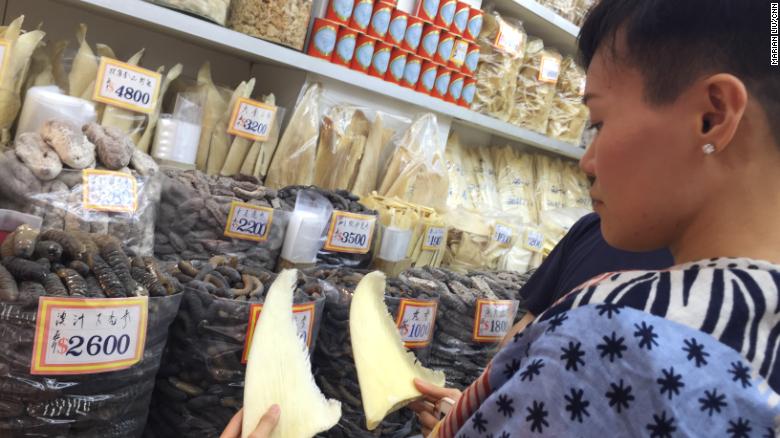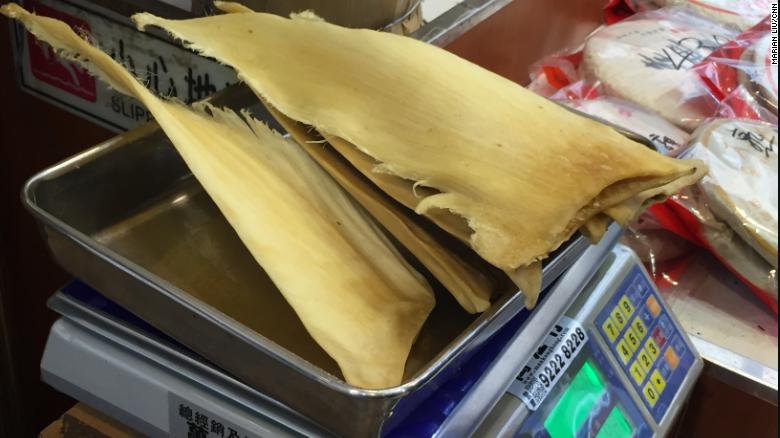Calif. shark fin bill would ban Chinese delicacy
Peter Fimrite,Jessica Kwong, Chronicle Staff Writers
Tuesday, February 15, 2011
A law that would ban the sale and distribution of shark fins in California, preventing hundreds of restaurants from serving an ancient Chinese delicacy, was introduced Monday, igniting an emotional debate between conservationists and Asian leaders.
The bill, introduced by Assemblymen Jared Huffman, D-San Rafael, and Paul Fong, D-Cupertino, would halt all California trade in shark fins, which are used to make Chinese shark fin soup, a tradition at banquets among Chinese people around the world.
Assembly Bill 376 says the California market for the expensive dish is helping drive rampant illegal shark finning in international waters. The practice involves cutting off the tails and fins of living sharks, which are then thrown back into the ocean to suffer and die.
The shark fin trade is believed by many scientists to be responsible for a catastrophic collapse in the worldwide shark population.
"I grew up on shark fin soup, but when I found out the effect it is having on the shark population two years ago, I stopped eating it," Fong said during a news conference at San Francisco's California Academy of Sciences attended by local shark experts, Chinese American chefs and environmentalists.
He likened shark finning to removing the tusks from elephants and the paws from tigers.
"The sharks are at the top of the food chain, and they maintain the balance in the ecosystem. If sharks fall, it will be like a house of cards. The rest of the ocean will fall," he said. "We need to stop this practice at the marketplace."
The proposed law, coming on the heels of a similar ban passed in Hawaii last year, faces considerable opposition from Chinese American restaurant and market owners, sea food distributors and fishermen.
Yee decries 'attack'
State Sen. Leland Yee, who is running for mayor of San Francisco, called AB376 an "attack on Asian culture."
"Right now, Costco sells shark steak," Yee said. "What are you going to do with the fin from that shark? This is another example in a long line of examples of insensitivity to the culture and traditions of the Asian American community."
Michael Kwong, a local seafood processor whose family has been in the business since 1905, said sharks are not even targeted by fishermen.
"It's usually a bycatch, but when they do catch a shark, they are going to use it. The entire carcass gets used," said Kwong, one of several restaurateurs and business owners who accompanied Yee at a news conference opposing AB376. "If this bill passes, there will be a lot of collateral damage."
Adequate protection
Shark fin supporters say an existing federal ban against shark finning by U.S. registered vessels is adequate protection. Shark fins cannot be imported into the United States unless the entire shark is captured and used.
Huffman pointed out that federal law does not apply to foreign-registered vessels, and it does not ban the sale of shark fins.
"If you'll excuse the pun, it's toothless," Huffman said.
Environmentalists argue that fishermen often target sharks solely for their fins, which are by far the most valuable part of a shark. Dried shark fin in San Francisco's Chinatown goes for between $178 and $500 a pound.
Shark fin soup, which has a gelatinous quality, costs between $250 and $500 for 10 people, depending on the quality and quantity of the main ingredient. It has been a traditional dish at banquets going back as far as the Han Dynasty, 1,800 years ago, when emperors and royals began consuming it. It is considered one of the four "treasures" of Chinese cuisine, along with abalone; fish maw, or bladder; and sea cucumber.
Marine biologists say there has been a 99 percent decline in oceanic whitetip sharks in the Gulf of Mexico over the past 15 years and an 89 percent decline in hammerhead sharks in the northwest Atlantic. The decline coincides with multiplying demand for shark fin soup by the burgeoning Chinese middle and upper classes.
The National Oceanic and Atmospheric Administration reported in 2005 that San Diego and Los Angeles are the two top entry points for shark fins in the United States. Dried shark fin can be found in many shops in San Francisco's Chinatown and around the Bay Area.
Shark fin has lost a little luster among some Chinese Americans who are aware of the environmental consequences.
Guo Sheng Lei, the executive chef at Louie's California Chinese Cuisine in San Francisco, said he has been serving shark fin soup for the past 25 years, but now only serves it upon request.
"I don't want to serve it," he said. "It's not good to have an imbalance in the ocean ecosystem. As a chef, I try not to contribute to that."
Health benefits
Ming Lee, 68, was having tea at Louie's on Monday. He said he eats shark fin on special occasions for the health benefits.
"It's good for the body. It has calcium and protein, and Chinese believe it is good for the bones and prevents cancer. It's like eating natural medicine," said Lee, who moved from Hong Kong 25 years ago. "I eat shark fin, because I feel like sharks eat a lot of fish, and we're killing the killers in the sea."
Charles Phan, the chef at the Slanted Door Vietnamese restaurant, and celebrity chef Martin Yan have thrown their weight behind the bill.
"It's never easy when you try to tell people what not to eat, but, in my view, the ocean needs protection," Phan said. "You might call it part of Chinese culture, but if you keep it up, shark will disappear. We need to do what's right for Mother Earth."
John McCosker, the chairman of aquatic biology for the California Academy of Sciences and one of the world's premier shark experts, said as many as 30 species of sharks are in danger, including great white sharks, which often swim in international waters.
It is a problem, he said, because studies have shown that the entire ecosystem, including many other species, suffer when the top ocean predators are gone.
"Sharks as top-level predators have disappeared within my lifetime," McCosker said. "At the same time, the ocean ecosystem has degraded. The two are interconnected."




 Reply With Quote
Reply With Quote
















